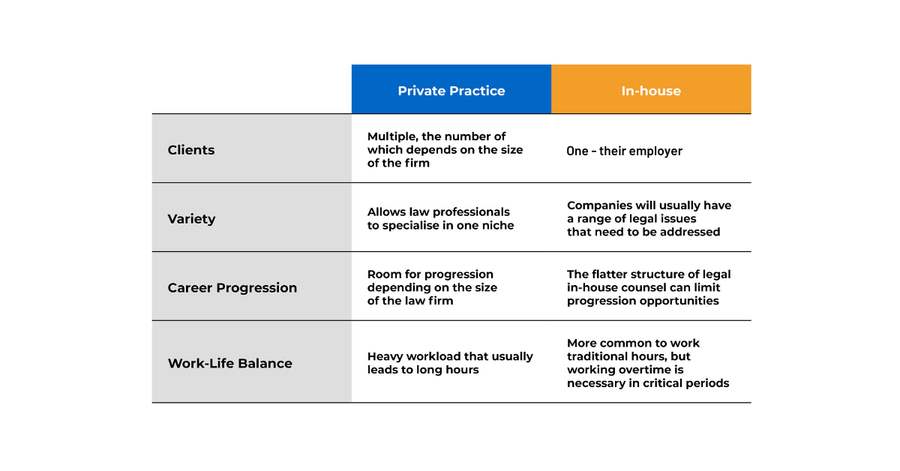16/01/2020
Back to all articles
For law students entering their final year of studies, their career options begin to open up and present various paths. Most newly qualified lawyers will seek initial opportunities in private practice, staying there between 1 – 5 years unless intending on a partnership position.
An alternative to private practice is working in-house. According to The Law Society, the number of solicitors working in-house is growing at a faster rate than those in private practice and is predicted to reach 35% of the profession by 2020.
So what factors can motivate in picking in-house law careers over private practice? Read 4 key differences below.
Private Practice vs In-House: Key Differences

Clients: Private Practice vs In-House
Working in private practice inevitably serves a portfolio of clients, and solicitors are often encouraged to bring in their own clients to drive revenue. These clients, with different needs, limitations and advantages, challenge solicitors to do the research properly from scratch each time.
Lawyers working in-house, however, work for a sole client. The advantage this serves is that solicitors have an existing knowledge of the company’s culture, requirements and goals. For those who are motivated by seeing long-term effects of their work, practitioners working in-house are likely to see the rewards of their efforts, whilst private practice solicitors will have already moved on to the next client before seeing the development of their previous work.
Variety in Private Practice vs In-House Careers
Working in law firms and the private practice sector is often attractive because it allows solicitors to specialise in a preferred area of law. This can be rewarding for those looking to develop in-depth expertise of a niche and build a career around it. An average law firm will give trainees 4 seats – areas of specialty – over the course of 2 years in order for both parties to assess the trainee's strengths and interests.
For others, the appeal of a niche can wear off and does indeed lead them to want more variety. Building a career in-house can expose lawyers to a well-rounded and multifaceted approach to the job, allowing them to develop know-how in a number of areas, such as in commercial/corporate, disputes, employment and property.
Career Progression: Private Practice vs In-House Law
Gaining experience in a law firm can have its advantages, in both large and small firms. While smaller firms will challenge NQs and younger associates to bring in their own business and be more hands-on with clients, great results will be more noticeable. Smaller firms do not usually have the resources of bigger ones, often meaning that entry-level solicitors will be relying more on their own initiatives, in turn instilling a ‘self-starter’ mentality that can be useful at a later stage in their career.
Being part of a company’s in-house legal counsel can sometimes have its limitations with a flatter structure, with less room for progression. Bigger companies will, of course, have more options than the smaller ones. In a small team, however, be it private practice or in-house, even the smaller victories stand out and, in the right situation, can lead to a promotion or a salary boost.
Harry Shepherd, Associate Director of FYTE Legal, says that “The starting salary for a NQ in private practice varies enormously, with the higher-ranking law firms offering entry numbers within the 100 - 140k range, doubling those of the NQs who operate in-house. It’s also not uncommon for salaries to progress in the initial stages of a law firm career.”
Work-Life Balance: Private Practice vs In-House
A well-known part of working in private practice is pressure and hours. Taking on client concerns leads to a heavy workload in order to avoid the consequences impacting not only the individual lawyers' career but also the overall revenue of the law firm in which they work. Solicitors working in law firms are all aware of the concept of billable hours, in which they charge the client for the time spent on projects. An average solicitor in private practice will work 2,000 billable hours annually.
Because in-house legal workers only need to meet the demand of their one client, it is rare that their work trickles into unorthodox hours or times of the week. Like any industry or role, however, things can change in crucial periods or moments of crisis; make no mistake that in-house counsel face the same pressures and intensity during their working day.
Ready to Take the Next Step in Your Law Career?
Ready to take the next step in your career in law? Browse our current job offerings or submit your CV for future opportunities.